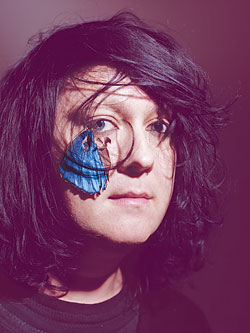
Antony Hegarty is afraid he might have had too much tea. That pot of apricot-lemon chai has, he fears, gotten him all riled up, and now he’s railing against President Bush’s last-minute regulations (“I consider it virulence. It’s people with virulent mental illness of their male archetype. It’s the same thing that informed the conquistadors. It’s the same thing getting them to pass out smallpox blankets”) and Sean Penn’s being cast in Milk (“It’s like blackface to me … it’s a continuing Hollywood minstrel show, co-opting queer stories and perversely building up the careers of these heterosexual bastards with the plumage of effeminacies, that they can wear this plumage of effeminacies without having to really be accountable”).
He stops, and tries to take it down an octave, retreating into the almost dainty solicitousness that’s part of his social affect. Antony is physically imposing, or anyway ought to be—he’s as big as an orc—but he’s shy. “You shouldn’t have given me that tea. I’m wild on it now. Do you want to have a muffin? It’s a scone, and it’s so delicious. You really have to try it because it’s so delicious. I’m so wired. I’ve been so toxic in this interview.”
What Antony, who doesn’t seem toxic in the least, has actually met to talk to me about is his new album, The Crying Light, a lushly orchestrated evocation of an almost mythic personal loneliness—a recurring theme. His last record, I Am a Bird Now, opened with his gorgeously unsettling falsetto pleading, “Hope there’s someone / Who’ll take care of me / When I die … who’ll set my heart free … ” Thanks largely to that album, these days Antony has an almost shamanistic hold on a type of sophisticatedly bleak romantic aesthete. His relationship to his audience recalls that of Nina Simone and JT LeRoy. But his confessionalism is more curated—in some way, self-protective. He also declared on Bird that “One day I’ll grow up, I’ll be a beautiful woman,” and though he says he considers himself “living in a male-identified body but still identifying as transgendered,” neither statement is an open invitation to discuss his personal life or, for that matter, even his cat’s recent death. No amount of tea will do that trick.
His friends are very protective, though drag artist Lady Bunny—who’s known him for nearly twenty years—offers this: “People who might know all the words to his songs don’t realize what a nut he is.” The two like to chat on the phone in gibberish, and just the other day he walked up behind her at a deli and bit her on the shoulder. “That thing is a clown.”
Antony was born in 1971, and moved with his family from England to San Jose, California (“the armpit of Silicon Valley”), when he was a kid. He still has a British accent, though it comes and goes. He didn’t fit in. He tried to stay connected to the English music scene, and played in a death-metal band. This was well before the Internet’s universalization of awkward-youth passions, so if you were an androgynous teen, you felt pretty isolated. He knew about John Waters and Boy George, but “subculture was really inaccessible,” he remembers. “If nothing was in print, you weren’t gonna see it. You’d grab little glimpses of things, if you’d picked up some old Details magazine or whatever. You’d just keep scrapbooks of things you were interested in.”
Freshman year, he went to UC Santa Cruz, where he did Waters-inspired midnight musicals. “One of my teachers said, ‘The only place where people do this kind of thing is New York City. There’s nowhere else for you to go.’ ” So he moved, in 1990, looking for mentors and a sense of lineage among the drag queens and outcast visionaries of still-squalid Avenue A. He’d seen the documentary Mondo New York, about the underground cabaret scene in the eighties, and he wanted to find Joey Arias and Dean Johnson and Phoebe Legere, attracted to their punk elegance.
But there was more to it than that. “First you realize you’re gay, and then you start hanging out in gay bars, and then you realize you don’t completely identify as male, and then you realize you are something else,” says Lady Bunny, who remembers him in whiteface makeup, a wedding dress, and combat boots. “Almost all gay ads say No fats, no fems, and let’s face it, Antony and I are both.”
Antony met Martin Worman, who’d worked with the Cockettes, a group of experimental androgynous performers, and was an NYU grad student. “He really took me under his wing,” says Antony. “There were a few guys at NYU in 1991, ’92, who were interested in trying to pass the torch, I guess, for a bunch of stuff that at the time seemed like vanishing culture.” He pored over sixties transvestite magazines; he was ravenous for the information. “I think I got a reputation as this kind of obsessive historian,” he says. “I was asking questions about people that had, in my mind, died prematurely. If there hadn’t been AIDS, I would have had access to them. So I was grilling them about that. And also just attending lots of stuff.” According to Lady Bunny, one of his favorite acts was an overweight, badly made-up drag queen named “Sugga Pie KoKo.” “Her shtick is that the audience doesn’t know if she’s retarded,” she says.
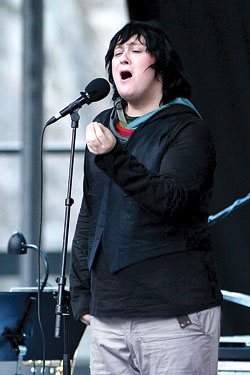
His quest wasn’t without dangers. “Not everyone wants to hang out with surrealist heroin-addicted transsexuals,” says Antony. “You kind of have to be one to get the all-access pass.” For years, he lived with his spinet and his cat in an SRO on West 15th Street.
He also started putting on his own elaborate, dark performances, with a group he called Blacklips. To make a living, he waited tables at Yaffa Café, and then worked in clubs like the Tunnel during the height of Michael Alig’s power. “You’d be paid $100 to lay with a taxidermized lion growling over you, or play an accordion in a cage with a stuffed bear,” he says. “I was never really part of that scene. Honestly, I couldn’t wait to get out of there. It was so toxic, and there wasn’t much creative about it. There wasn’t a lot of big dreams happening.”
In 1995, he started the Johnsons, which was originally a performance troupe. As the music part of their act became more prominent, the cognoscenti started to take notice, from Bette Midler to David Bowie. John Cameron Mitchell saw him play early on at Squeezebox, which is also where his Hedwig and the Angry Inch character originated. “He was his own gorgeous, androgynous, perfect alien creature of light,” Mitchell says.
Around then, Antony had a sort of artistic epiphany, allowing him to break from his postadolescent goth nihilism. It was 1996 and he was in his bedroom listening to Liz Fraser (of the ethereal musical group the Cocteau Twins) sing on an EP called Twinlights when suddenly she was making sense. “She spent her whole career singing in personal, intuitive languages. On the last record, she started singing in English, and the words were revelatory. The last line of the last song was ‘I still care about this planet. I still feel connected to nature and to my dreams. I have my friends and my family. I have myself. I still have me.’ I remember thinking, the most radical thing you can do in 1996 is to project hope. Because everyone else was apocalyptic. Everything else was pushing toward the millennium, like, ‘Well, we’re done with 3 million years anyway, so fuck it. Let’s have unsafe sex at the West Side Club.’ ”
And it was right around then, too, perhaps not coincidentally, that things started moving for Antony in his career. Suddenly, there was hope. He’d won a New York Foundation for the Arts fellowship, which he used to record his first album. Music producer Hal Willner sought him out after picking up his EP “I Fell in Love With a Dead Boy” and introduced him to his friend Lou Reed. In 2000, Joe’s Pub took the Johnsons into residency.
Best of all, since seeking out his underground lineage here, Antony found a new generation he identified with. “It was the first time I found a group of kids that were like ten years younger than me, that actually operated on the same tenets that I’d been operating. Which is about heavy sincere-ism, and aggro-sincerity, and non-cynicism, which is kind of more risky. Not guarded,” he says. These are the freak-folk types, like Devendra Banhart and CocoRosie. “My generation was just busted. There were a few of us trying stuff out, but as a collective, my generation was incapable of making that gesture.”
Antony toured with Reed; Reed sang on I Am a Bird Now. In 2005, the record won the prestigious Mercury Prize in England. And then, suddenly, a certain kind of everybody knew who he was. He moved into his own apartment on Mercer Street. He was playing Carnegie Hall and enthralling people like MoMA curator Klaus Biesenbach, who remembers a bam performance in which Antony, wearing all white, sang in a completely unlit theater. “It was stunning—a beautiful visualization of time,” Biesenbach says breathlessly. All the attention helped his friend Andy Butler sell a dance album, Hercules and Love Affair, on which Antony sang.
For his own new album, Antony worked with, among others, the young avant-garde classical musician Nico Muhly, whom he met through Laurie Anderson and Philip Glass. “What I liked about the album process,” Muhly wrote via e-mail from Iceland, “is how careful Antony was about the notes—it wasn’t the case that he wanted a huge, decadent thing; instead, it’s like really carefully crafted, and there is no wasted gesture.” They worked on the arrangements in the south of France, and then in the home of “this genius Sicilian songwriter-composer Franco Battiato, in Milo, near Mt. Etna, in Sicily.”
Antony describes The Crying Light this way: “The focus of the album is on my relationship to the environment and the elements. The natural world.” The song “Another World” is the embodiment of this intention, and in a way it brings him back to where he started. “I wanted to write a song about the changing ecology,” he says. It reminds him of when he came to New York and saw another ecosystem in decline. “This avant-garde queer underground, I got invested in it in a militant way because it was vanishing.” He stops and thinks about this. “I have to write an essay on that one day: How the impact of AIDS on underground culture is like the impact, today, of humans on the world.”
Later, Antony reconsiders, e-mailing me with second thoughts at 12:52 a.m. “This idea that a new desire for hope has emerged in the last few years in the music scene … I think it’s silly for me to project that it is happening in the world around me. There have always been people that felt hopeful and those that did not. Really my observation of more people manifesting hopeful art and music was a reflection of my own burgeoning desire to do the same. So I just wanted to rope it back in and keep the focus on myself rather than making all sorts of unsupported generalizations about the rest of the world. Thanks. best wishes, antony”
Antony’s Influences: Keeping Up With the Johnsons
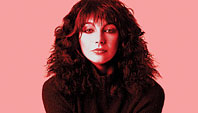
1. Kate Bush
The Kick Inside is the first album Antony bought, when he was 7 years old. He still listens to it.
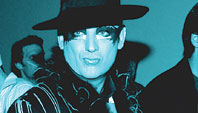
2. Boy George
One of his earliest heroes, when he was a child; Boy George later sang on Antony’s “You Are My Sister.”
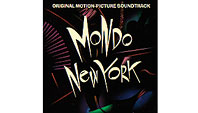
3. Mondo New York
A 1988 documentary tour of underground New York in which Joey Arias, dressed as Billie Holiday, sings “A Hard Day’s Night.”
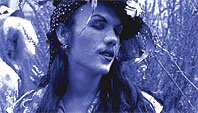
4. Cockettes
San Francisco–based gender-bending hippie performance group that inspired some of Antony’s performances.
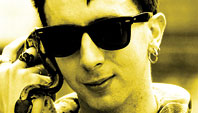
5. Marc Almond
Gay Soft Cell crooner who later appeared on the BBC with Antony singing “River of Sorrow.”
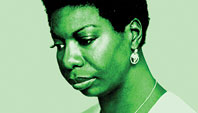
6. Nina Simone
“Things would shine out of her, sometimes in a very brutal way,” Antony says admiringly of the singer, who died in 2003.
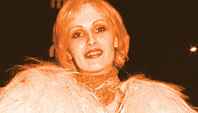
7. Candy Darling
Transsexual Warhol acolyte whose picture, as she was dying, graces the cover of I Am a Bird Now.
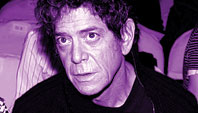
8. Lou Reed
Antony was featured on his 2003 album, The Raven, and tour, where he sang “Candy Says,” Reed’s Darling tribute.
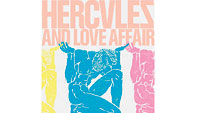
9. Andy Butler
Old friend who went on to form Hercules and Love Affair. Their album features Antony singing, giving him disco cred at last.
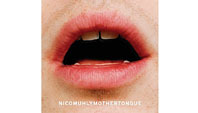
10. Nico Muhly
Worked with Muhly on a symphony project, plus two songs on Antony’s new album, and “a few other flourishes.”